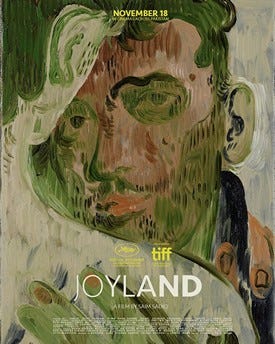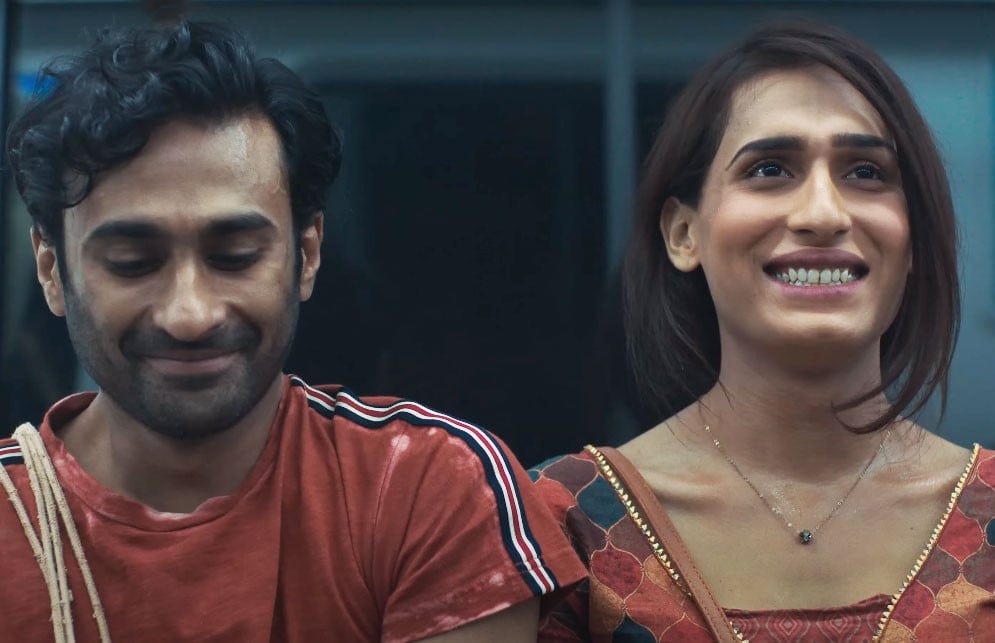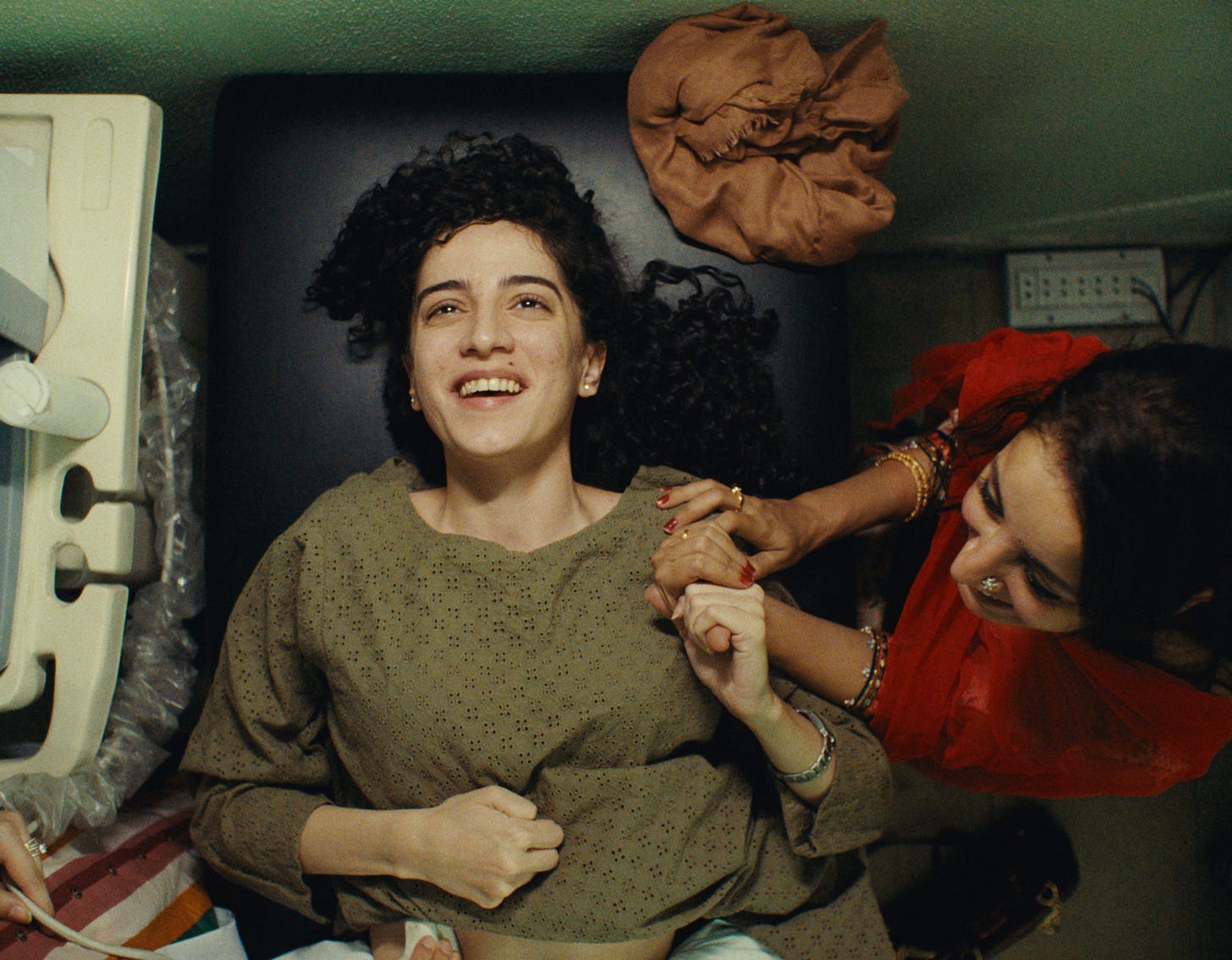Joyland: A Film That Questions What Is Normal
Disclaimer: these are my thoughts on the film after watching it, crying, sleeping, crying some more. These thoughts are fresh, they will fester and grow even more, I know! That's the magic of Joyland!
I’m writing this, raw with the emotions Joyland has left me in. Joyland is not a movie you can simply ‘watch’, it is a movie that demands to be felt, it demands you to move with it, and it demands you to think. (don’t worry, I’ll warn you before I give spoilers)
It’s funny how we go about our days, carrying with us the confines in which society wants us to exist, carrying with us the expectations our family structures place on us. This passiveness is not normal, by any standard, yet we think it to be, ‘Yaar har kisi ke issues hotay hain’. That’s the thing Joyland holds on to, and takes control of. Each character in Joyland exists in a moment in time where ‘society and its related weights and expectations’ just becomes too heavy to handle, too large to ignore. Each character snaps under this weight and each one of them is befallen with tragedy. On the surface, it seems like a dramatized version of daily living in Pakistan, but as I have sat with my feelings about this movie, the more I believe that this story is no exaggeration- it is our reality reflected back to us. Our families are no less fragile that Haider’s.
What Biba (Alina Khan) represents is a shock to the system, any family can get such a shock, no matter what shape, size, or gender. Her existence in Haider’s (Ali Junejo) life breaks the façade of the family, this isn’t to say that Biba is the cause, however, it is the rigidity of how society demands we behave that breaks the façade. Isn’t it funny how on one hand, society places the family as the strongest structure; the basis on which everything else is built, but one person, one shock, can unravel it all?
*Some* people called for the ban of Joyland based on their own transphobia. Many believed the film to be based on the character of Biba, funny how Biba has the ability to deliver shocks to the system off and on the screen. Albeit for me, the film wasn’t about Biba. While her character is incredibly important, the focus of the film are Haider and Mumtaz (Rasti Farooq); their marriage with respect to them as individuals, together, and to all those around them. The film shows us how society’s constraints weigh on both of them, they both falter under the weight, unable to help each other, they falter even deeper. As they sink deeper, and as they grow further apart, something has to give. And that is the tension of the film.
Joyland will absolutely leave you with your emotions sore, your eyes gleaming with tears, and your mind teeming with anger. This is a story of family, and of a marriage, that unraveled all because of our fixation of “log kya kaheinge”, it is a film whose demon is not a character but the faceless structure of society and societal pressures, where the villain is the patriarchy; a concept that promises security but which only gives unforgiving loneliness.
When learning fiction writing, we’re taught the concept of ‘upping the stakes’. Biba is the factor that ups the stakes each and every time, her actions cause ripple effects, that further up the stakes. I’ll say it again, Biba is the shock that Haider’s family receives, replace Biba with any other shock, and the fragility of ourselves, our families and our society will shine too bright to ignore.
Joyland is extraordinary, because of how seemingly ordinary the story boils down to be.
Okay, some spoilers, so if you haven’t seen it, go away!
What Joyland does superbly well is hold you close; the shots are taken wonderfully close to the intimacy between characters, it almost feels intrusive being there. Like, when Mumtaz and Haider spoke about Karachi, the scene opens with an incredibly close shot with all you can see is the back of their heads touching, and only their ears fully visible. Such scenes are beautifully juxtaposed with the silence of the film, where thoughts are allowed to linger, where you hear the city of Lahore. That’s actually one of the things about this movie that will stick with me, the sounds of the movie and how they form the symphony of the film. Even the scenes with Biba and Haider are shot close to their faces, you feel almost intrusive, almost like you shouldn’t be there.
Other than this, the film’s writing and cinematography (and the actor’s acting) tell the story of years in mere seconds. The opening scene with the qurbaani sets the stage immediately, between Haider and his father, and between Haider and Mumtaz. Nuchhi’s smoking outside the house, and only around Mumtaz is incredibly telling of her struggles and her constraints. Even the way Mumtaz consoles Haider when he cries into her arms is so telling, Mumtaz acts almost robotic, she ‘consoles’ him as if its her job. The thing that broke me the most was Mumtaz’s last scene, when Haider enters the washroom; Mumtaz holds the bottle of poison, she doesn’t hide it, and yet Haider doesn’t notice it. It’s almost as if she gave him a last chance but he failed, so she drank the rest and passed away. The thing is, Joyland isn’t built on big plot lines, it is a movie based on its small moments, but the impact of those small moments is massive, they move you, hours, days and maybe even weeks after you finish watching the film.
This paragraph doesn’t fit in here but whatever, this is my newsletter, my rules! The character of Mrs. Fayyaz is both the most brave and the most tragic. Her life has been relegated to her loneliness, she finds comfort in caring of Haider and Saleem’s father, but this is something no one looks upon favorably. When she spends the night at their house, and hell breaks loose, she speaks up for herself, but her own son calls her delusional. She speaks again and asks for Haider’s family to take her in, but even they reject her. She well and truly is lonely, no one there to understand her, no one there to hear her, and no one with her to stand by her.
The scenes post Mumtaz’s death, up till the end of the film, take a knife to your heart. There’s no way else to describe them. They are a reflection on all of us! Nucchi is right when she screams in the house, “Hum sab ne maara hai ussay!” (we all killed her). The promises exchanged between younger Haider and younger Mumtaz, the spark in her eyes, their flirty exchange, and her beautiful laugh, all point to the fact that while she may have taken the poison herself, everyone else in her life failed her, they failed her so horribly that she was pushed to the extreme. Mumtaz knew that her freedom was already taken from her, and that the child she carried would completely end her dreams, she knew her husband was of no support anymore and that the only other woman in the house was just as constrained as her. Death, for her, was the only out.
It seems so cliché right now to say that the film broke me, but the thing is, it did! It broke my soul a little bit. We all live in this society, in this patriarchy, day in and day out, we follow its directions, rarely challenging it and rarely fighting back. It kills us everyday.
Joyland, at its core, is a beg, a beg for all of us to stand up for ourselves, to challenge this society and live happily, not only in the little moments but in the big ones too! We have all known and been Haider, Mumtaz, Saleem, Nucchi, Abba, Mrs Fayyaz, and even Biba. The film begs us to fight these restrictive set of rules we’ve placed on ourselves, to fight them for ourselves, but also for those near and dear to us. It’s as if we’ve forgotten what it means to live, and only remember what it is to live by these “rules”.








You’ve written this so beautifully, thank you for sharing your heart and your thoughts. I will always remember this newsletter as the document of that moment when we both finished watching at the same time and messaged each other. And then the voice notes! What you’ve done with your words and your thoughts is beautiful! You’ve taken your experience of all the tiny moments that were haunting the rest of us, the ones we woke up to the next morning with, the ones we could not explain to ourselves or others, and how deeply they cut us. I’m looking forward to many more of these letters! ❤️
Okay I still haven’t been able to go watch it because, well life, but after reading this I can’t wait to. Thanks Arsalan for sharing your thoughts on the film. I truly felt them! ♥️